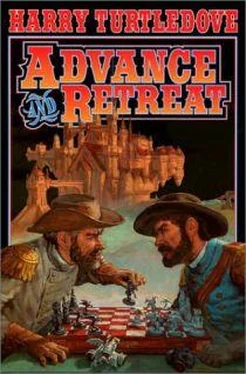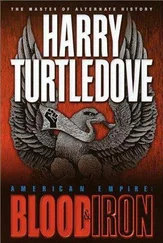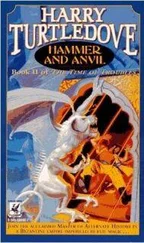“Isn’t this fun?” Smitty said, flinging up dirt.
“It’s a lot more fun than getting shot,” Rollant answered. “To the hells with me if I want to stand out there in the open for the traitors to shoot at.”
“Well, there is that,” Smitty admitted. “But it’s a lot of work, too.”
“I don’t mind work,” Rollant said. “This is the kind of work I chose for myself when I volunteered to be a soldier.”
Smitty gave him a quizzical look. “You sure you’re one of those shiftless, no-account, lazy blonds everybody’s always talking about?”
Only a few men in the regiment could ask him a question like that without making him angry. Smitty, fortunately, was one of those few. Rollant paused in his own digging, thought for a moment, and then said, “You’ve got a farm outside of New Eborac City, so you work for yourself, right?”
“For myself, and ahead of that for my old man, yes,” Smitty answered.
“You work hard, then, right?”
“I’d better.” Smitty wiped his sweaty face on his sleeve. “Who’ll do the job if I don’t?”
“Now imagine your boss doesn’t care about you-he just wants to get work out of you,” Rollant said.
“I didn’t know you’d met my father,” Smitty said.
That threw Rollant off his glideway path of thought. He needed some effort to return to it: “Suppose he doesn’t care about you, like I said. Suppose he can do anything he wants to you. Suppose you have to do what he says, no matter what it is. And suppose, no matter what you do, you don’t get to keep a copper’s worth of money from the crop you bring in.”
“Doesn’t sound very good,” Smitty said. “Got any more supposes?”
“No, that’s the lot of them,” Rollant said. “Suppose they’re all true. How hard would you work then?”
“I’d do the least I could get away with, I expect.” Smitty paused, taking the point. “So you’re saying blonds aren’t lazy on account of the gods made ’em lazy. You’re saying they’re lazy on account of the liege lords give ’em the shitty end of the stick.”
“Either that or they give ’em the whole stick right across the back.” Rollant turned away so Smitty wouldn’t see his enormous grin. He’d actually made an ordinary Detinan understand some small fraction of what serfdom was like.
“Here, I’ve got a question for you,” Smitty said.
“Go ahead,” Rollant answered.
“You know that book that lady wrote- Aunt Clarissa’s Serf Hut ? How true to life is that?”
Ten years before the War Between the Provinces broke out, Aunt Clarissa’s Serf Hut had scandalized the south and north, though in different ways. It had outraged the south while infuriating northern nobles. They called it a pack of lies, wrote denunciations and rebuttals by the score-and banned it in their provinces to keep serfs from getting their hands on it.
“Well, I’ve read it,” Rollant said. “Read it a while after it came out, because I needed to learn my letters first after I ran away from Baron Ormerod. I thought it was pretty good. The liege lord in the book was a lot nastier than Ormerod, but there are some like him. I never knew a blond who was made out of sugar and honey paste, the way some of the ones in the story are, but it tells about what a hard, nasty life serfs have, and that’s all pretty much true. What did you think of it?”
“Made me want to grab the first northern nobleman I saw and give him a good kick in the teeth,” Smitty said.
“Suppose you just get back to work instead,” Sergeant Joram rumbled from behind him.
“Yes, Sergeant,” Smitty said meekly, and dug in with the shovel. But working didn’t keep him from talking: “Some of the people we’ve got set over us, they might as well be liege lords themselves.”
He had a point. In a lot of ways, underofficers had more power over common soldiers than nobles did over serfs. Rollant hadn’t thought of it like that before, but it was so. Does that make me like Baron Ormerod? he wondered. In spite of the warm work, he shivered. That was a chilling thought if ever there was one.
* * *
From unicornback, Colonel Florizel called, “Come on, men! Keep moving. If we get around behind the stinking southrons, we can bag the whole rotten lot of them.”
“The colonel’s right,” Captain Gremio agreed. “If we move fast now, it pays off later. We can give King Avram’s men just what they deserve.”
Sergeant Thisbe was blunter about the whole business, as sergeants have a way of being: “Keep moving, you worthless slobs! We’ve got somewhere to get to, and we’re going to get there, gods damn it!”
And the men paid more attention to Thisbe than they did to Gremio and Florizel put together. That didn’t particularly surprise Gremio. He could order them into fights where they might get killed, but Thisbe had the power to make their everyday life hells on earth.
On they tramped, making the best time they could down muddy roads. They never saw a southron unicorn-rider. Captain Gremio assumed that was Ned of the Forest’s doing. Ned was no gentleman, as far as he was concerned. Gentleman or not, Ned knew what he was doing with unicorn-riders.
At last, with evening twilight fading from the sky, they had to stop for the night. Thisbe sent the spriest men out to gather wood and fill water jugs. Other soldiers simply flopped down, exhausted. As fires began to burn, the weary men gathered around them to toast hard bread and meat and simply to get warm. All through the first part of the night, more and more stragglers joined them: men who’d marched as hard as they could, but hadn’t been able to stand the pace.
Gremio held a chunk of hard bread over the flames on a forked stick. He didn’t watch while he did it; he was one of those who preferred not to think about the weevils that were abandoning his supper. Sometimes, of course, he had to eat bread without toasting it first. He preferred not to think about everything that crunched between his teeth then, too.
Sergeant Thisbe sat at the same fire, looking as worn as Gremio felt. One by one, soldiers lay down where they were and started to snore. Thisbe yawned, but stayed awake. So did Gremio. After a while, with more and more snores rising around them, Gremio quietly asked, “Can we talk?”
“I don’t really think we’ve got a whole lot to say to each other, sir,” Thisbe answered. “Not about that, anyway.”
“I know what I know,” Gremio said. “I have the evidence.” Yes, he was a barrister through and through.
“You’ll do what you want to do, sir.” Thisbe’s voice was toneless.
“But-” Gremio couldn’t shout. He couldn’t even swear, not without… He shook his head. “I don’t want to tell anybody about-”
“I’m glad,” the sergeant said.
“I just want to-”
Sergeant Thisbe interrupted again: “To what, sir?” Normally, a sergeant who kept interrupting an officer would find himself in trouble in short order. Things weren’t normal here, as Gremio knew too well. Thisbe went on, “There’s nothing you can do, sir. There’s nothing anybody can do till the war’s over.”
“But then-” Gremio said.
“But then, who knows?” Thisbe broke in once more. And, once more, Gremio let the sergeant do it without a hint, without so much as a thought, of reprimand. “I think you’re the best company commander the regiment’s ever had. To the hells with me if I know whether that means anything else.” A shrug. “We’ll find out then. Not now.”
“You know what I think of you-some of it, anyhow,” Gremio said. “You know I wanted to get you promoted to lieutenant.”
“I didn’t want that. You know I didn’t want that.” The harsh, flickering shadows from the fading fire exaggerated Thisbe’s rueful expression. “Now I suppose you think you know why I didn’t want it, too, gods damn it.”
Читать дальше












